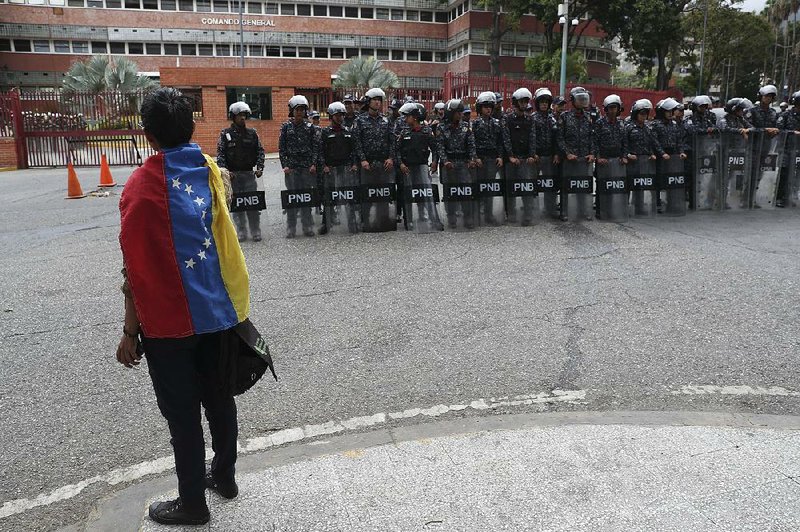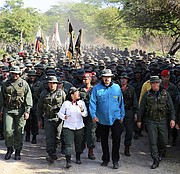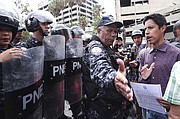CARACAS, Venezuela -- Venezuelan opposition leader Juan Guaido on Saturday acknowledged that he had miscalculated his support within the military in his failed attempt to oust President Nicolas Maduro.
Guaido -- the head of the National Assembly who in January declared himself the interim president -- also said that if the U.S. were to offer military support to Venezuelan forces fighting Maduro, he would take that offer to the parliament for a vote.
The opposition leader told The Washington Post that he had expected Maduro to step down during a groundswell of defectors within the military. Guaido appeared Tuesday outside a Caracas military base with a small group of security forces and called for defections among both rank-and-file soldiers and the military's senior brass.
Instead, it became clear that he had failed to rally the armed forces. Clashes between protesters and police then broke out, and Maduro's security forces quelled street protests, leaving five dead.
"Maybe because we still need more soldiers, and maybe we need more officials of the regime to be willing to support it, to back the constitution," Guaido said. "I think the variables are obvious at this point."
He said his camp was seeking to do outreach with Maduro's military and senior civilian backers, but he did not suggest that the opposition was close to another breakthrough.
"Because the fact that we did what we did and it didn't succeed on the first time, doesn't mean it's not valid," he said. "We are confronting a wall that is an absolute dictatorship. ... We have recognize our mistakes, what we didn't do, and we did too much of."
Guaido did not back unilateral U.S. military intervention, saying that any American military support must be alongside Venezuelan forces who have turned against Maduro. He gave no further specifics on what would be acceptable.
President Donald Trump's administration has said all options are on the table, but officials have not clearly signaled whether the administration would favor intervention against Maduro.
Asked what he would do if U.S. national security adviser John Bolton called him up with an offer of intervention, Guaido said he would reply: "Dear friend, ambassador John Bolton, thank you for all the help you have given to the just cause here. Thank you for the option, we will evaluate it, and will probably consider it in parliament to solve this crisis. If it's necessary, maybe we will approve it."
The remarks were among the strongest Guaido has issued yet on U.S. military assistance, which remains largely unpopular among even those Venezuelans opposed to Maduro.
Guaido added: "I think today there are many Venezuelan soldiers that want to put an end to [leftist guerrillas], and help humanitarian aid get in, who would be happy to receive cooperation to end usurpation. And if that includes the cooperation of honorable countries like the United States, I think that would be an option."
CAMOUFLAGE, FIST BUMPS
Maduro, however, has sought to portray Venezuela's generals as loyal to him, even as the country -- once one of the wealthiest in Latin America -- has slid into hyperinflation and escalating hardship.
Venezuelan television on Saturday showed Maduro wearing a camouflage hat as he shook hands and exchanged fist bumps with security forces during a visit to a military base. He then watched troops engage in a shooting exercise.
"Loyal forever," Maduro bellowed to a crowd of cadets in green uniforms.
But Maduro's government also has shown signs of weakness. It has not moved to arrest Guaido, despite his calls for Venezuelans and the military to rise up.
Maduro portrays Venezuela as a victim of U.S. antagonism toward the socialist principles championed by Hugo Chavez, who died in 2013 after naming Maduro as his anointed successor. Guaido and his opposition blame the country's sharp decline on state corruption, mismanagement and authoritarianism.
Guaido on Saturday urged Venezuelans to go to military garrisons and other official buildings to make the case against Maduro.
"The aim is to deliver our message without falling into confrontation or provocation," Guaido tweeted Saturday.
But while the march on Wednesday -- immediately after the failed uprising -- drew thousands of people, the protests on Saturday largely fizzled, with crowds reported in the dozens.
About 150 protesters gathered Saturday near La Casona, a residence historically used by Venezuelan presidents. Some approached police and asked for their aid with appeals printed on presidential letterhead, reflecting Guaido's claim to be the country's rightful leader.
A Venezuelan policeman burned the document with a lighter and let the ashes fall to the ground.
The armed forces "won't be blackmailed or bought," said a second officer standing nearby.
Demonstrator Andrea Palma watched police burn the paper.
"They think it's a joke. They don't take us seriously. They're not listening," she said.
Guaido on Saturday said he was not worried.
"We have been doing this for 20 years," he said, referring to opponents of Chavez. "Getting frustrated and tired is part of it, but Venezuelans have demonstrated that they always take the fight again when they have to."
APPEAL TO CUBA
Canadian Prime Minister Justin Trudeau reached out to Cuba late Friday to help push for new elections in Venezuela. Canada is among the more than 50 nations that recognize Guaido as Venezuela's rightful leader, saying Maduro's election last year was illegitimate.
In a call with Cuban President Miguel Diaz-Canel, Trudeau "underscored the desire to see free and fair elections and the constitution upheld in Venezuela," according to a Canadian statement. They discussed "ways they could work together to support a peaceful resolution to the crisis."
Trudeau joined a group of 14 Latin American countries meeting Friday in Peru's capital. The so-called Lima Group decided to enlist Cuba, Venezuela's closest ally, in brokering a solution.
While Cuba has previously rejected the Lima Group's support for Guaido, a senior diplomat recently cited Cuba's mediation in past regional conflicts.
"Dialogue is what will help," Josefina Vidal, Cuba's ambassador to Canada, said in an interview. "If there is willingness, solutions can be found."
Vidal was the key liaison to the U.S. for the normalization of relations with Cuba under President Barack Obama's administration. Canada hosted some of the secret talks between U.S. and Cuban officials.
Russia, which supports Maduro, is also signaling deepening concern about the crisis. Russian state news agencies say Foreign Minister Sergey Lavrov is to meet with his Venezuelan counterpart today in Moscow.
On Monday, Lavrov plans to meet with U.S. Secretary of State Mike Pompeo in Finland on the sidelines of an Arctic Council session. Washington and Moscow accuse each other of interfering in Venezuela's internal affairs, and Pompeo is among those raising the prospect of U.S. military intervention.
Guaido said Saturday that while he supports talks about the crisis, he still opposes direct talks with Maduro's camp unless both sides agree beforehand that they will negotiate Maduro's departure.
"Sitting down with Maduro is not an option," he said. "That happened in 2014, in 2016 in 2017. ... The end of usurpation is a precondition to any possible dialogue."
Information for this article was contributed by Anthony Faiola of The Washington Post; by Stephen Wicary of Bloomberg News; and by Christopher Torchia and staff members of The Associated Press.
A Section on 05/05/2019


